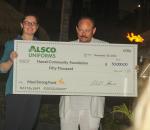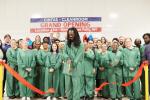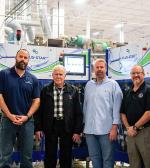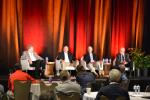CHICAGO — The tight labor market has made hiring new employees challenging in the laundry and linen services industry.
Adding another wrinkle to this is the fact that over the next few years, more people will be reaching retirement age. So, how can operators aid the retirement process and help retain the knowledge and experience of the individual leaving?
American Laundry News spoke with three human resources (HR) experts to get their input on this subject: Barbara Holland, an HR advisor for SHRM, the Society for Human Resource Management; Katie Rowland, human resources manager for Plymate in Shelbyville, Indiana; and Catalina Dongo, vice president of human resources for UniFirst Corp., headquartered in Wilmington, Massachusetts.
Let’s start with an update on the status of long-time employees. Are they retiring sooner? Are more retiring these days?
HOLLAND: More have stayed in the job market and have retired a little bit later, possibly due to uncertainty and just finances. Maybe portfolios have dropped, various reasons, but we do see kind of a shift toward the boomers.
People are retiring, but I don’t think it’s in the droves that we expected, though. That’s coming, maybe in the next five to six years. Those boomers are going to be getting to that 67—the 100% Medicare retirement or social security retirement benefit. Then you’ll start seeing, I think, moving toward that higher number than it was before.
I do think that you’ve kind of seen a mix of people staying in and are staying a little bit longer, and others are starting to contemplate what it’s going to look like when they retire.
ROWLAND: We are not experiencing that. I think what we see more of is long-time employees working past normal retirement age.
DONGO: First, let me start by saying that we are extremely grateful for our long-time team partners and remain indebted to the commitment and dedication they have shown throughout their years of service at UniFirst. I thank them for continuing to always deliver for our company, our customers and our communities.
We are proud to say that UniFirst has one of the highest employee tenures in the industry. The average tenure for our top 100 managers is 20 years, our service staff 15 years and our route service representatives 15.
To answer the second part of your question, yes, we are indeed seeing more of our long-time team partners retiring this year than in previous years.
We anticipate this trend to continue throughout the next decade as many of our team partners are choosing to retire closer to their retirement age. But we are prepared, as any well-run business should be, with proactive succession planning to ensure business continuity.
Are retiring employees ever enticed by retention efforts? If so, what types? If not, why not?
HOLLAND: Some organizations work at helping people transition into retirement. So, rather than going from working completely full time and then all of a sudden they’re retired, I think that’s part of what you know.
Some people are reluctant about what’s that going to look like when you’ve worked your whole life, it’s hard to imagine. Are you going to be bored? There’s transitioning. I think there’s more around helping people transition into retirement. Maybe stepping back to part-time and then slowly transitioning into retirement. Maybe taking a couple of years to do that.
You’re helping them prepare for it, but you can also be looking at how are we going to replace these workers that are going to be leaving and taking either a ton of knowledge with them or you just have a lot of reliance on your longtime employees.
It’s that the transition can be beneficial to both the employer and the employee preparing for that eventual date when they are completely gone.
ROWLAND: Each retiring coworker situation is different. I believe if the conditions are right (for example, flexibility, continuation of some benefits), this may be enticing.
But for the most part, if a co-worker’s plan for retirement has gone smoothly, they are ready to go and have little interest in extending their work careers.
DONGO: Yes. In some cases, we encourage our team partners who are approaching retirement age to stay with us. In the case of key employees, we develop structured retention plans that may include financial and other incentives, along with technology-based tools to help them navigate this important life decision.
For some, it may be better to wait; for others, it may be more beneficial to retire. There are a lot of factors to consider from a financial perspective, as well as a personal one. Our goal is to help our team partners make an informed decision and a successful transition should they decide it’s time to retire.
How important is it to show appreciation for the retiring employee? How does that affect the remaining workforce?
HOLLAND: I think it’s huge, especially in your morale from an employee engagement, when people feel valued, when they are appreciated, when people are retiring and they’ve spent quite a bit of time with an organization, acknowledging that, honoring that, respecting them, thanking them for those years of service.
They could have gone to a lot of other opportunities and chose not to. I think it shows the rest of the staff that the company values individuals. They’re not just a warm body performing a function, but people care.
It definitely sends messages to the rest of the staff when you acknowledge people for their contributions to the organization and obviously wishing them well in the next journey of life.
ROWLAND: It is absolutely essential to show appreciation for retiring coworkers. The key being emphasis and recognition for what they have contributed to the organization.
It also sets an important example for those remaining in the workforce, that they are valued, appreciated and will be recognized.
DONGO: It’s very important to show appreciation for all employees, including those who are retiring. One of our founding Core Values here at UniFirst that we continue to live by to this day is treating people with respect.
My advice is to value your retiring employees, treat them with the utmost respect and recognize their important contributions to your organization. Your remaining workforce will look at the transition as something that they may experience themselves one day, so we are very cognizant of that and committed to making it a positive experience.
This is not only crucial to boost morale and create a secure workplace, but also, it’s just the right thing to do.
At UniFirst, we are geographically dispersed with more than 260 locations across North America. Each location has its own “microculture” and retiring team partners are celebrated and recognized in a variety of ways, each driven by a strong corporate culture.
Some of our locations will host going away parties, lunchtime celebrations or others may use our President’s Club venue to honor these individuals.
Check back Thursday for Part 2 on first steps to successfully replace and pass on a retiree’s knowledge.
Have a question or comment? E-mail our editor Matt Poe at [email protected].



















































































































































































































































